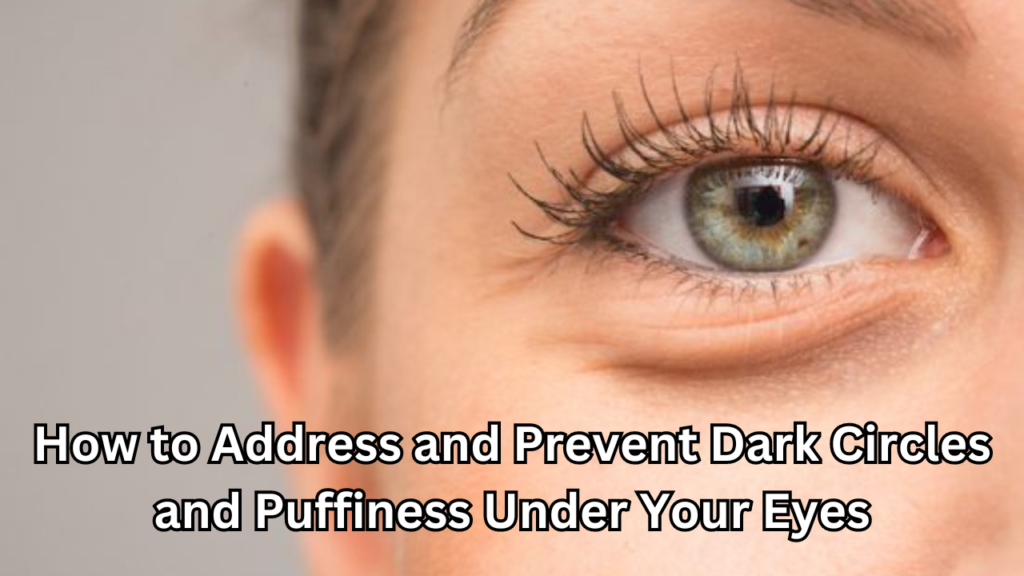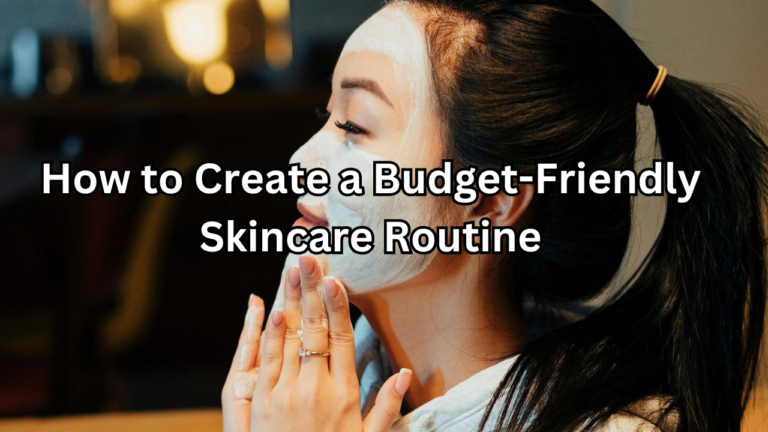

Table of Contents
Introduction
Prevent Dark Circles and puffiness under the eyes are common cosmetic concerns that affect many people. These issues can be particularly frustrating as they tend to make you look tired, older, or unwell, regardless of how well-rested or healthy you might feel. Understanding the nature of these problems and how they impact your overall appearance is crucial in finding effective solutions.
Explanation of the Problem
Dark Circles: Dark circles appear as discolored areas under the eyes, often giving the appearance of a shadow or bruise. They are usually caused by a combination of factors, including genetics, aging, and lifestyle choices. The skin under the eyes is thin and delicate, which makes the underlying blood vessels more visible, creating a darkened effect.
Puffiness: Puffiness under the eyes manifests as swelling or bags, making the eyes look droopy or tired. This swelling can result from fluid retention, poor circulation, or the natural aging process. The accumulation of fluid can create a bulging effect, making the eyes appear puffy and less vibrant.
Why It Matters
The appearance of dark circles and puffiness can significantly affect one’s self-esteem and overall appearance. These issues often convey an impression of fatigue or stress, even when one is feeling well-rested and healthy. For many, they can be a source of embarrassment or frustration, impacting personal and professional interactions. Addressing these concerns can help enhance self-confidence and contribute to a more refreshed, fashion look.
Purpose of the Article
This article aims to provide readers with a comprehensive understanding of dark circles and puffiness, including their causes and effects. By exploring practical solutions and preventative measures, readers will learn how to effectively manage and reduce these issues. The information and tips offered will empower readers to take proactive steps towards achieving a brighter, more refreshed appearance, ultimately improving their confidence and well-being.
Causes of Prevent Dark Circles
Dark circles can be attributed to a variety of factors, each contributing to their appearance in distinct ways. Genetics play a significant role, as inherited traits can lead to naturally thinner skin under the eyes, making blood vessels more visible and resulting in a darker hue. Aging compounds the issue, with a loss of collagen and elasticity causing the delicate skin to thin further and highlight underlying dark pigments. Allergies also contribute through the release of histamines, which cause blood vessels to dilate and increase visibility of dark circles. Additionally, lifestyle factors such as lack of sleep, chronic stress, and poor diet can exacerbate the problem, as insufficient rest and high stress levels disrupt blood flow and skin health, while nutritional deficiencies can impair the skin’s ability to repair and rejuvenate.
Genetics: How Family History Can Play a Role
Genetics can significantly influence the appearance of dark circles. If dark circles run in your family, you may be predisposed to them due to inherited traits. Specifically, individuals with a genetic predisposition often have a naturally thinner skin under their eyes, which makes the blood vessels beneath more visible. Additionally, certain genetic factors can affect melanin production or the skin’s ability to retain its youthful elasticity, further contributing to the appearance of dark circles.
Aging: Impact of Skin Thinning and Loss of Elasticity
As we age, our skin naturally loses collagen and elastin, two essential proteins that maintain skin firmness and elasticity. This loss causes the skin under the eyes to become thinner and more translucent. Consequently, the blood vessels and underlying dark pigmentation become more prominent, resulting in darker shadows. The aging process also leads to the weakening of the supportive tissues around the eyes, which can exacerbate the appearance of dark circles by allowing fat to protrude or fluid to accumulate.
Allergies: How Histamines Can Cause Dark Circles
Allergic reactions can contribute to the development of dark circles through the release of histamines in the body. When your body reacts to allergens, histamines cause blood vessels to dilate and become more permeable. This dilation increases blood flow to the area under the eyes, leading to inflammation and swelling. The combination of increased blood flow and inflammation can darken the skin under the eyes and make dark circles more noticeable. Common allergens include pollen, pet dander, and certain foods, which can trigger this response.
Lifestyle Factors: Lack of Sleep, Stress, and Poor Diet
Several lifestyle factors can exacerbate the appearance of dark circles:
- Lack of Sleep: Inadequate rest can lead to poor blood circulation and fluid retention, both of which contribute to the formation of dark circles. When you don’t get enough sleep, the skin under your eyes can appear dull and pallid, making dark circles more pronounced.
- Stress: Chronic stress can affect your overall health, including your skin. Stress increases the production of cortisol, a hormone that can impact the skin’s appearance by disrupting its natural balance and leading to inflammation.
- Poor Diet: A diet lacking in essential nutrients can negatively affect skin health. Deficiencies in vitamins and minerals, such as vitamin K, vitamin C, and iron, can lead to weakened skin and poor circulation, contributing to the formation of dark circles. High salt intake can also lead to fluid retention and puffiness, making dark circles more apparent.
Causes of Puffiness
Puffiness under the eyes can stem from several factors, each contributing to the swelling in distinct ways. Fluid retention, often caused by high sodium intake or inadequate hydration, leads to excess water accumulating in the delicate skin around the eyes, resulting in noticeable puffiness. Allergies also play a significant role, as the release of histamines in response to allergens causes blood vessels to dilate and leak fluid into the surrounding tissues. Additionally, fatigue and poor sleep quality can exacerbate puffiness, with fluid pooling under the eyes due to improper sleep posture or insufficient rest. Sinus problems further complicate the issue, as sinus congestion can create pressure and fluid buildup in the eye area, making the eyes appear swollen and puffy.
Fluid Retention: Impact of Sodium and Hydration Levels
Fluid retention is a primary cause of puffiness under the eyes. When your body retains excess fluid, it can accumulate in the delicate skin around the eyes, leading to noticeable swelling. High sodium intake from processed foods is a common culprit, as it disrupts the balance of fluids in your body, causing your tissues to hold onto water. Additionally, inadequate hydration can exacerbate fluid retention. When you’re dehydrated, your body compensates by retaining more water, which can contribute to puffiness around the eyes.
Allergies: How They Can Lead to Swelling
Allergic reactions can cause puffiness under the eyes due to inflammation and fluid accumulation. When you come into contact with an allergen, your body releases histamines to fight the perceived threat. Histamines cause blood vessels to dilate and become more permeable, leading to leakage of fluid into the surrounding tissues. This increased fluid retention and inflammation result in noticeable swelling and puffiness around the eyes. Common allergens such as pollen, dust mites, and pet dander can trigger these reactions.
Fatigue and Sleep Issues: The Role of Sleep Quality and Posture
Fatigue and poor sleep quality can significantly impact the appearance of puffiness under the eyes. When you don’t get enough rest, your body’s ability to repair and regenerate is compromised, leading to fluid buildup in the eye area. Additionally, sleep posture plays a role; lying flat can cause fluids to pool in the under-eye area. Elevating your head with an extra pillow can help prevent fluid accumulation and reduce puffiness. Chronic sleep deprivation and irregular sleep patterns can further exacerbate the problem, making the eyes appear swollen and tired.
Sinus Problems: How Sinus Congestion Can Cause Puffiness
Sinus congestion can also contribute to puffiness under the eyes. When your sinuses become inflamed or congested, they can create pressure and fluid buildup in the surrounding tissues. This increased pressure can lead to swelling in the under-eye area, making the eyes appear puffy and uncomfortable. Sinus infections, colds, and other respiratory issues can exacerbate this condition, as they disrupt normal sinus drainage and contribute to fluid retention.
Skincare Routine for Dark Circles
Cleansing: Importance of Removing Makeup and Impurities
Proper cleansing is crucial for managing dark circles, as it helps to remove makeup, impurities, and excess oils that can contribute to dull and tired-looking eyes. A gentle, non-irritating cleanser should be used to avoid stripping the delicate skin around the eyes, which can exacerbate the appearance of dark circles. Regular cleansing ensures that your skincare products can effectively penetrate the skin and work to reduce dark circles.
Hydration: Benefits of Using Eye Creams and Serums with Ingredients Like Hyaluronic Acid
Hydration is key to maintaining healthy skin and reducing the appearance of dark circles. Eye creams and serums that contain hyaluronic acid are particularly effective, as this ingredient helps to attract and retain moisture in the skin, plumping it up and minimizing the visibility of dark shadows. Regular use of hydrating products can improve skin elasticity and reduce the hollowness that often accentuates dark circles.
Brightening Agents: Role of Vitamin C and Caffeine in Reducing Darkness
Brightening agents play a significant role in addressing dark circles. Vitamin C, known for its antioxidant properties, helps to brighten the skin and reduce the appearance of pigmentation under the eyes. It also stimulates collagen production, which can improve skin texture. Caffeine, on the other hand, constricts blood vessels and reduces puffiness, which can help diminish the darkness associated with under-eye circles.
Sun Protection: How UV Exposure Exacerbates Dark Circles
Sun protection is essential for preventing and managing dark circles. UV exposure can damage the delicate skin around the eyes, leading to increased pigmentation and worsening the appearance of dark circles. Using a broad-spectrum sunscreen daily, and choosing eye creams with built-in SPF, can protect the sensitive area from harmful UV rays and help maintain a more even skin tone.
Skincare Routine for Puffiness
Cold Compresses: Effectiveness of Using Chilled Spoons or Eye Masks
Cold compresses are an effective remedy for reducing puffiness under the eyes. Applying chilled spoons or eye masks helps to constrict blood vessels and reduce swelling by promoting vasoconstriction. The cooling effect also soothes the area, alleviating discomfort and making the eyes look less puffy. Regular use of cold compresses can provide a quick and visible reduction in puffiness.
Anti-Inflammatory Ingredients: Benefits of Caffeine, Green Tea, and Chamomile
Incorporating anti-inflammatory ingredients into your skincare routine can significantly help with puffiness. Caffeine is known for its ability to reduce swelling by constricting blood vessels, while green tea and chamomile contain antioxidants and anti-inflammatory properties that soothe the skin and reduce puffiness. These ingredients help to calm inflammation and improve circulation, leading to a more refreshed appearance.
Reducing Sodium Intake: Impact of Diet on Fluid Retention
Diet plays a crucial role in beauty, particularly in managing puffiness through sodium intake. High sodium consumption can lead to fluid retention, which exacerbates swelling under the eyes, affecting your overall appearance. Reducing sodium in your diet can help minimize fluid retention and prevent puffiness, enhancing your beauty. Opting for a balanced diet with lower salt content not only supports overall skin health but also reduces the likelihood of under-eye swelling, contributing to a more radiant and refreshed look.
Proper Hydration: Importance of Drinking Enough Water
Proper hydration is essential for preventing and alleviating puffiness. Drinking enough water helps to flush out excess sodium from the body and reduces fluid retention. Staying well-hydrated ensures that your skin remains supple and less prone to swelling. Consuming adequate water throughout the day supports overall skin health and contributes to a more vibrant and less puffy appearance.
Lifestyle Changes to Prevent Dark Circles
Adequate Sleep: Tips for Improving Sleep Quality
Getting adequate sleep is essential for reducing dark circles. Aim for 7-9 hours of quality sleep each night to allow your body to repair and rejuvenate. To improve sleep quality, establish a consistent sleep schedule by going to bed and waking up at the same time each day. Create a relaxing bedtime routine, such as reading or taking a warm bath, and ensure your sleep environment is comfortable and free from distractions. Limiting screen time before bed and maintaining a cool, dark, and quiet room can also enhance sleep quality.
Healthy Diet: Incorporating Vitamins and Minerals That Benefit Skin Health
A balanced diet rich in essential vitamins and minerals can help prevent dark circles. Incorporate foods high in Vitamin C, such as citrus fruits and leafy greens, which promote collagen production and brighten the skin. Vitamin K, found in green leafy vegetables, supports blood circulation and can help reduce dark circles. Additionally, foods rich in antioxidants, like berries and nuts, protect the skin from damage and support overall skin health. Staying hydrated by drinking plenty of water is also crucial for maintaining skin elasticity and reducing the appearance of dark circles.
Stress Management: Techniques Like Meditation and Relaxation
Chronic stress can contribute to the formation of dark circles by disrupting sleep and affecting overall skin health. Incorporate stress management techniques into your routine to help mitigate this effect. Practices such as meditation, deep breathing exercises, and yoga can help reduce stress levels and promote relaxation. Regular physical activity and hobbies that bring joy can also alleviate stress and improve your overall well-being, positively impacting the appearance of dark circles.
Lifestyle Changes to Prevent Puffiness
Elevating Head During Sleep: How It Helps Reduce Fluid Accumulation
Elevating your head while sleeping can help reduce puffiness under the eyes. By using an extra pillow or a wedge pillow, you can prevent fluid from accumulating in the under-eye area. This position allows fluids to drain away from the eyes, minimizing swelling and helping to maintain a less puffy appearance. Consistent use of this technique can significantly reduce puffiness and improve the overall look of your eyes.
Regular Exercise: Benefits of Physical Activity on Overall Circulation
Regular exercise enhances overall circulation and helps to reduce puffiness by promoting better blood flow and fluid drainage. Engaging in physical activities such as walking, jogging, or swimming encourages the movement of blood and lymphatic fluid, which helps to prevent fluid retention and swelling. Additionally, exercise supports overall health and can improve sleep quality, further contributing to reduced puffiness.
Limiting Alcohol and Caffeine: Impact on Hydration and Sleep Quality
Alcohol and caffeine can negatively impact hydration and sleep quality, both of which contribute to puffiness. Alcohol is a diuretic that can lead to dehydration and fluid retention, while excessive caffeine consumption can disrupt sleep patterns. Limiting your intake of these substances can help maintain proper hydration levels and support better sleep, reducing the likelihood of puffiness under the eyes.
Home Remedies and Natural Solutions
Cucumber Slices and Tea Bags: How They Soothe and Reduce Swelling
Cucumber slices and tea bags are popular home remedies for soothing and reducing swelling around the eyes. Cucumbers have a cooling effect and contain antioxidants that help reduce inflammation and puffiness. Simply place chilled cucumber slices over your closed eyes for 10-15 minutes. Similarly, used tea bags, particularly those containing green or chamomile tea, can provide relief. The caffeine and antioxidants in tea help to constrict blood vessels and reduce swelling. Chill the tea bags before applying them to your eyes for a soothing treatment.
Almond Oil and Vitamin E: Benefits for Skin Repair and Hydration
Almond oil and Vitamin E are excellent for skin repair and hydration. Almond oil is rich in essential fatty acids and vitamins that help to nourish and moisturize the delicate skin around the eyes. Applying a small amount of almond oil gently to the under-eye area before bed can help reduce dark circles and keep the skin hydrated. Vitamin E, known for its antioxidant properties, also supports skin repair and reduces the appearance of dark circles. Look for eye creams or serums that contain Vitamin E, or apply pure Vitamin E oil directly to the area.
DIY Masks: Recipes for Natural Treatments
DIY masks can offer natural treatments for dark circles and puffiness. For a simple under-eye mask, mix equal parts of yogurt and honey, and apply it to the under-eye area for 10-15 minutes. Yogurt’s lactic acid helps to lighten the skin, while honey provides moisture and has anti-inflammatory properties. Another effective mask combines mashed avocado with a few drops of lemon juice. Avocado is rich in healthy fats and vitamins, while lemon juice can help brighten the skin. Apply this mixture for 10 minutes to rejuvenate the under-eye area.
When to Seek Professional Help
Persistent Issues: When to Consult a Dermatologist or Healthcare Provider
If you find that home remedies and lifestyle changes are not improving your dark circles or puffiness, it may be time to consult a dermatologist or healthcare provider. Persistent issues could indicate underlying health concerns that require professional assessment and treatment. A dermatologist can offer advanced treatments and tailored advice based on your specific needs.
Potential Underlying Conditions: Importance of Ruling Out Serious Health Concerns
In some cases, dark circles and puffiness can be symptoms of more serious underlying conditions, such as allergies, sinus infections, or other health issues. It’s important to seek professional help to rule out these conditions and receive appropriate treatment. Addressing any underlying health concerns can help alleviate symptoms and improve the overall appearance of your eyes.
Conclusion
Prevent Dark Circles, effectively addressing and prevent dark circles and puffiness requires a holistic approach that combines targeted women skincare with thoughtful lifestyle choices. By maintaining a consistent cleansing routine, using hydrating and brightening products, and protecting your skin from UV damage, you can significantly reduce the appearance of dark circles. For puffiness, incorporating cold compresses, anti-inflammatory ingredients, and making dietary adjustments can provide noticeable improvements. Remember, consistency is key to achieving the best results. Embrace these strategies and make them a part of your daily routine to enjoy a refreshed and rejuvenated appearance. Your commitment to these practices will not only enhance your appearance but also boost your confidence and overall well-being.
Recap of Key Points
Addressing and preventing dark circles and puffiness involves a multifaceted approach that includes both skincare and lifestyle adjustments. To combat dark circles, focus on a consistent cleansing routine, proper hydration with eye creams containing hyaluronic acid, and the use of brightening agents like Vitamin C and caffeine. Additionally, protect the delicate skin around your eyes from UV exposure to prevent further darkening. For puffiness, cold compresses, anti-inflammatory ingredients, and lifestyle changes such as reducing sodium intake and staying hydrated are essential. Elevating your head during sleep and engaging in regular exercise can also significantly reduce puffiness and improve overall appearance.
Encouragement
Adopting these strategies can make a noticeable difference in the appearance of your eyes and overall skin health. Incorporating these practices into your daily routine may take some time, but consistency is key. By prioritizing your skincare and making mindful lifestyle choices, you can achieve a fresher, more vibrant look. Remember, taking care of your skin is not just about aesthetics—it’s about feeling good and maintaining your overall well-being.





